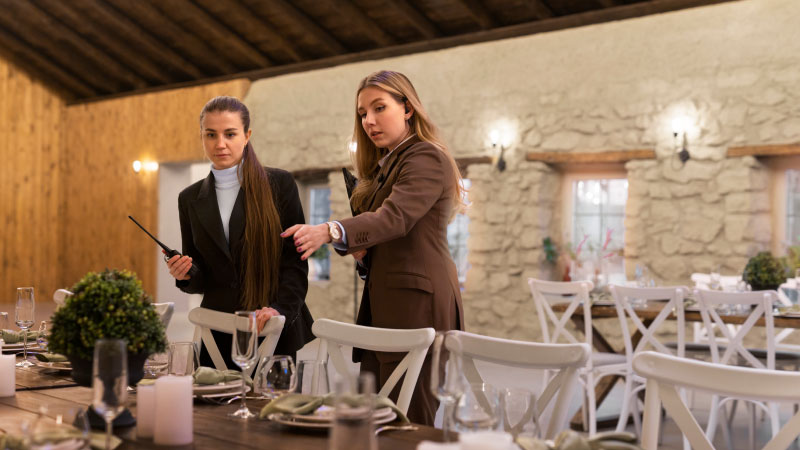Building strong relationships with clients and maintaining a stellar reputation are essential for any successful event organizer. These goals go beyond just planning and executing an event—they require genuine connection, clear communication, and an unwavering commitment to quality. Let’s dive into the best strategies event organizers use to keep clients happy and build a reputation that keeps them in demand.

1. Get to Know Your Client’s Vision Inside Out
One of the simplest yet most powerful ways to connect with clients is by understanding their vision. Go beyond the basics—ask questions that give you a sense of their goals, their style, and even their personality. Take time to learn about their previous events, what worked, what didn’t, and what their absolute “must-haves” are. This is your roadmap for delivering an event that feels like it was made just for them.
After these initial meetings, document their preferences and keep notes on even the smallest details. Refer back to these notes as you plan so that every choice you make reflects their tastes. Clients notice when you remember the little things, and it reinforces that their event is in caring, capable hands.
2. Communicate Clearly, Early, and Often
Good communication is the foundation of any strong relationship. Make it a priority to keep clients in the loop at every stage of the process. Provide clear, regular updates that let them know what’s happening without overwhelming them with details. You can do this by using tools like project management apps or even simple shared documents. Many clients feel reassured seeing progress in real time, so they don’t have to wonder if things are on track.
Also, make sure clients feel comfortable reaching out whenever they need. Let them know they can contact you with questions, updates, or last-minute changes. When clients feel that you’re accessible and responsive, it goes a long way in building trust.

3. Be Realistic About What’s Possible (and What Isn’t)
An event’s success hinges on setting clear expectations from the start. Talk openly with your clients about budget constraints, timelines, and any limitations that might affect their plans. Honesty here isn’t just practical; it’s essential for avoiding disappointments later on. Clients appreciate knowing what’s realistic, and they’re more likely to trust you when you communicate openly.
Also, flexibility is key. Build some room into your plans for those inevitable last-minute adjustments. When clients know that you’re prepared to pivot if necessary, they feel more relaxed and confident about the entire process.
4. Showcase Creativity and Expertise
Once you understand a client’s goals, look for ways to add value and make the event even more memorable. Share creative ideas or innovative touches that they may not have thought of. For example, if a client is hosting a product launch, suggest unique interactive experiences or creative visuals that align with their brand. Clients appreciate when you bring fresh ideas to the table—it shows them you’re not just following their vision, but elevating it.
Stay on top of industry trends and share relevant ones with your clients. Whether it’s new technology, fresh decor ideas, or the latest catering styles, clients will notice your dedication to keeping their event on the cutting edge.
5. Be Proactive About Potential Issues
Experience teaches that things can and do go wrong. The trick is to anticipate problems before they happen. Use your past experiences to pinpoint areas that might be challenging, whether it’s a vendor’s reliability or a weather contingency plan. Discuss these potential risks with your client, and show them your prepared solutions.
When clients see that you’ve already thought through “what if” scenarios, it reassures them that they’re in capable hands. Plus, being proactive shows that you take their event’s success personally.

6. Consistency and Attention to Detail Matter
Your reputation is built on delivering consistent quality, time and time again. Pay attention to even the smallest details to make sure each aspect of the event aligns with the vision you’ve developed with the client. This includes working only with vendors who you know will match your standards.
Wherever possible, test everything beforehand. Conduct sound checks, double-check the seating arrangements, and make sure every element meets the client’s standards. When clients see this level of commitment, they know they can rely on you to deliver a polished, professional experience.
7. Express Appreciation After the Event
Once the event wraps up, take a moment to show genuine gratitude. A simple thank-you note or a thoughtful message goes a long way toward showing clients they’re valued beyond the invoice. If you know your client’s preferences, consider a small token of appreciation, like a favorite treat or a personalized item.
Follow up with clients to get their feedback and learn what you could improve next time. They’ll appreciate that you’re continuously seeking to grow and improve, and it’s a great way to turn a one-time client into a long-term partner.
8. Take Responsibility and Problem-Solve With Integrity
When challenges do arise, handle them with integrity and professionalism. If there’s an issue, be upfront about it with the client and quickly outline your plan to resolve it. Clients don’t expect perfection, but they do expect honesty and accountability.
Taking ownership builds respect and strengthens your reputation. Clients appreciate knowing that, no matter what happens, you’ll do everything possible to make things right.

9. Building Your Reputation Beyond Just One Event
Maintaining a strong reputation is about more than just the event itself. Clients today look for organizers who are involved in the industry, connected with trends, and recognized as leaders. Build your credibility by sharing your successes, posting about events on social media, and showcasing testimonials and client feedback on your website.
Participate in industry conferences, publish articles, or even share tips on social media to show you’re a proactive, knowledgeable professional. When clients see your dedication to growth and excellence, it reassures them that they’re working with a true expert.

Successful event planning goes well beyond simply managing logistics. It’s about making clients feel heard, understood, and cared for throughout the entire journey. By focusing on these relationship-building techniques, you’re not only setting yourself up for successful events but also for long-lasting partnerships. When you consistently exceed expectations, clients won’t just remember you—they’ll keep coming back and recommending you to others. That’s the power of genuine, dedicated client relationships in the world of event planning.



